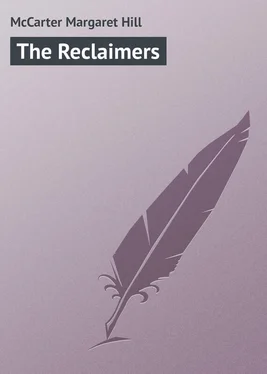Margaret McCarter - The Reclaimers
Здесь есть возможность читать онлайн «Margaret McCarter - The Reclaimers» — ознакомительный отрывок электронной книги совершенно бесплатно, а после прочтения отрывка купить полную версию. В некоторых случаях можно слушать аудио, скачать через торрент в формате fb2 и присутствует краткое содержание. Жанр: foreign_prose, на английском языке. Описание произведения, (предисловие) а так же отзывы посетителей доступны на портале библиотеки ЛибКат.
- Название:The Reclaimers
- Автор:
- Жанр:
- Год:неизвестен
- ISBN:нет данных
- Рейтинг книги:4 / 5. Голосов: 1
-
Избранное:Добавить в избранное
- Отзывы:
-
Ваша оценка:
- 80
- 1
- 2
- 3
- 4
- 5
The Reclaimers: краткое содержание, описание и аннотация
Предлагаем к чтению аннотацию, описание, краткое содержание или предисловие (зависит от того, что написал сам автор книги «The Reclaimers»). Если вы не нашли необходимую информацию о книге — напишите в комментариях, мы постараемся отыскать её.
The Reclaimers — читать онлайн ознакомительный отрывок
Ниже представлен текст книги, разбитый по страницам. Система сохранения места последней прочитанной страницы, позволяет с удобством читать онлайн бесплатно книгу «The Reclaimers», без необходимости каждый раз заново искать на чём Вы остановились. Поставьте закладку, и сможете в любой момент перейти на страницу, на которой закончили чтение.
Интервал:
Закладка:
"Be you goin' on the Sage Bresh train, lady?"
The questioner had turned back after the country girl and the fat man had passed out.
Jerry looked at him without taking his question to herself. His shoes, draped with wrinkled-down hose, were very much worn. His overalls flapping around his legs, his shirt and neck and face and hair and hat, were all of one complexion, a fuzzy, yellow brown.
"Be you goin' on this train, too?"
It was a humble, kindly voice, and the scaly old hand holding the door open against the high prairie wind was only a fisherman's hand. The deep-set eyes in the yellow-brown old face were trained to read the river; the patient mouth set to wait for the catch of lines and nets.
Jerry had never in her life spoken to such a creature. So far as she was concerned, he did not exist.
"This is the only train on the Sage Bresh to-day, lady. The reg'lar train's busted through a culbert out yander," the high, quavering voice persisted.
A sharp tooting from the engine down the line emphasized the statement, and Jerry saw the grinning red-faced tick-tick man hastily wheeling mail-sacks and sundry other parcels by the door. In a bewildered way she rose and passed out, giving no recognition to the shabby old man who had been thoughtful of her ignorance.
"We gotta go to the last car down yander, lady," the old man squeaked out, as he started down the cinder-paved way with a bearlike, shuffling, sidewise sort of gait.
Jerry followed him slowly to "the last car down yander."
A plain day coach, the sixtieth and last vertebra in this long mechanical spine, was already crowded with a bunch of grubs, none of whom could belong to Jerry Swaim's sphere. Moreover, they were all tightly packed in and wedged down so that it was impossible to detect the leaving off of the full-fare passenger and the beginning of suit-cases, old-style telescopes, baskets, bundles, boxes, half-fare children, bags of fruit, lunch-crates, pieces of farming tools, babes in arms, groceries – everything to cabbages and kings. Jerry wondered where all these things came from. Every object in that car, human being or salt pork, crying baby or kingbolt, was a thing to Jerry Swaim. And all of them were very warm and nervously tense, as if the hot June wind had blown them all inside, that the hot June sun, through the closed windows, might stew them stinkily; or, through the open windows, grime their sweaty faces with hot dust off the hot prairie. There was only one vacant seat left. It was on the shady side, facing the rear of the car, and was half occupied already by the humble grub of the squeaky voice. The girl, Thelma, and the fat little man had taken the seat opposite him. As Jerry entered the car the little man was on his feet, bowing and strutting and insisting that a woman with a babe in arms should exchange seats with him, putting her on the cool side, while he took her place in the sun across the aisle from Thelma. In the transfer he did not see Jerry, who was looking in vain for an opening in that mass of "human various." It was the humble grub who saw her standing there. Evidently his little yellow-green eyes took her measure at a glance, but he did not spread out his effects and stare out of the window as some other men were doing, nor gather himself and his into his own half of the seat to make room for her beside him. He rose, and in a shrill little quaver he bade her take his place. It did not occur to Jerry to tell him that there was room for two, as she saw him shuffle down the aisle with a queer, limping hitch. In the same impersonal way she watched him through the open door, sitting on the rear platform during the long afternoon, humpbacked against the cinders and dust that beat upon him, swaying with the rocking car, jerked along over a sun-baked, treeless prairie at the tail of a long jerky freight-train. He meant nothing to this dainty city product; his kind had never entered her world; no more had the red-faced, tow-headed young mother, with white eyebrows and hat knocked rakishly aslant, with her big, restless, bald-headed baby rolling over her in waves, sprawling about Thelma, and threatening to bump its head off as it overflowed all the narrow space, aimlessly and persistently.
But if Jerry Swaim felt out of her element in this company, her fellow-passengers felt much more embarrassed by her presence. Thelma's neat gingham dress became limp and mussy and common. The tired mother's yellow lawn was rumpled into a dish-rag. And with every jerk of the train she lost a hair-pin from her tow hair that was already stringing down in long wisps on her neck. The baby, really a happy, white, blue-veined infant, became a fussy flushed impossibility.
All this, it seemed, just because of the presence of a faultlessly dressed, fair-faced stranger who awed everybody by not seeing them, but whose very daintiness and beauty drew them hungrily to her. Nobody could be in Jerry Swaim's presence and not feel the spell of her inherent magnetism.
The laughter and complaints of the passengers dulled down to endurance. Only the face of the short man wore a smile. But his mouth was made with that kind of a curve, and he couldn't help it. Breathing deeply and perspiring healthfully, he sat against the heat streaming into his side of the car, and forgot his troubles in his unbreakable good nature. For a long time he and Thelma had talked across the aisle above and through the train's noises. Their talk was all of Paul and Joe's place, and the crops; of how glad Thelma was to be at home again on Paul's account; and how long it would take her yet if the alfalfa and wheat turned out well.
Jerry heard it all without knowing it, as she looked at the monotonous landscape without knowing it. And then the dry prairies began to deepen to a richer hue. Yellow wheat-fields and low-growing corn and stretches of alfalfa broke into the high plains where cattle grazed. And then came the gleam of a river, sometimes shallow along sandy levels, sometimes deep, with low overhanging brush on either side. And there were cottonwood-trees and low twisted elms and scrubby locust and oak saplings, and the faint, fresh scent of moisture livening the air.
The train jerked itself to a standstill, thought better of it, and hunched along again for a rod or two, then jostled itself quiet again.
Jerry was very drowsy now, but she was conscious of hearing the fat man calling out, cheerfully:
"Home at last, Thelmy. There's Paul waiting for you. Well, good-by."
And of Thelma's "Good-by" in a louder tone than was necessary. Of more strutting and bowing and no end of luggage clearing itself away.
Through the window Jerry caught sight of a tall, fair-haired boy, who looked like Thelma, except that in his white face was the pathos of the life-cripple. She saw Thelma kiss him, and then the two started down the sunny, cindery side-track together. In the distance, close to the river, there was a small plain house under a big cottonwood-tree. The glimpse of red about a little porch meant that the crimson ramblers were in bloom there. Oh, the roses of "Eden," and the cool rose-arbor! Jerry must have dreamed then, for "Eden" was about her again. Through it the limping grub came humbly to claim his sundry own from behind and under the seat. Even in "Eden" she thought how much like a clumsy bear his gait was. And when the little man called him "Teddy" she knew he was not a fisherman sort of creature, but a real bear in yellow-brown overalls, and that the general fuzziness of his make-up was fur, and that his stubby, scaly hands were claws. He dropped off somewhere when the freight took a siding very near the river. It was the Sage Brush, but it ran through the "Eden" grounds and Uncle Cornie was throwing his discus beside it. The rose-arbor was just across the aisle. The little fat man was sitting in its doorway, with a new moon of a smile on the smooth side of his round head where his face was, a half-quizzical, half-sympathetic smile with no guile in it. Jerry really liked him for that kind of a smile. It belonged to him. The rose-arbor was very warm, for the man was sweating more copiously than ever… Uncle Cornie was gone. The limping Teddy Bear was gone… It was very, very hot and sunny in "Eden." The big maples and cool lilacs were gone… "Eden" was gone. In its stead came the art exhibit in the cool gallery in the city. And that yellow-gray desert landscape with the flaming afterglow and purple mists. The flames seemed almost real, and the yellow gray almost real, and the art-gallery was getting warmer as "Eden" had done. It was positively hot… And then the Sage Brush freight was laboring slowly and painfully through a desert with clack and roar and cloud of cindery dust… Jerry sat up, wide awake, and looked up at the fat stranger who was looking at her, the smile on the inside of his face, as it were, showing only in the eyes.
Читать дальшеИнтервал:
Закладка:
Похожие книги на «The Reclaimers»
Представляем Вашему вниманию похожие книги на «The Reclaimers» списком для выбора. Мы отобрали схожую по названию и смыслу литературу в надежде предоставить читателям больше вариантов отыскать новые, интересные, ещё непрочитанные произведения.
Обсуждение, отзывы о книге «The Reclaimers» и просто собственные мнения читателей. Оставьте ваши комментарии, напишите, что Вы думаете о произведении, его смысле или главных героях. Укажите что конкретно понравилось, а что нет, и почему Вы так считаете.












